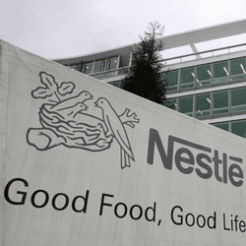As Nestle’s chairman denounces corporate philanthropy, he proposes a trickle down theory for corporate social responsibility. Celina Ribeiro says at least he’s upfront.
It’s enough to make you choke on your fair-trade four-fingered Kit Kat: Corporate philanthropy is not a priority at Nestle SA.
It’s not really that surprising. You can continue to enjoy that chocolate coated wafer now. The multinational, despite its recent conversion to all things Fair Trade Foundation, has never been a darling of the ethical consumer/human rights campaigner/Greenpeace crowd– you know, for little things like palm oil production and marketing baby milk in Africa.
But that its disdain for corporate philanthropy is so public is, however, shocking. I almost want to applaud them for their honesty.
In a recent interview Nestle chairman Peter Brabeck-Letmathe declared that he is “personally very against corporate philanthropy”. Brabeck-Letmathe’s commitment to the principles of capitalism go deeper than I’ve yet heard anyone admit to; “You shouldn’t do good with money which doesn’t belong to you,” he said. “What you do with your own money, this is absolutely fine.”
He went on to suggest, as he has in the past, that doing good will probably, really, most likely end up doing bad anyway. So why bother? “Most social problems are extremely complex… You think at first glance you solve a problem here, but the reality is you’re just creating one somewhere else,” he said.
Last year – before the flagship Kit Kat went fairtrade – Nestle launched its not-CSR programme, called Creating Shared Value. The company also last year invested $27m in microfinance, which has largely gone to its own producers and suppliers to help them lift productivity. This, imagines Brabeck-Letmathe, is how companies should be helping to build a better society. It’s the trickle down theory, applied to corporate social responsibility. What is good for the shareholder is good for the cocoa farmer’s children.
At this point you may be tempted to spit out your Fairtrade Nescafe, but again, I urge you to complete the digestive process.
It is depressing that Nestle feels it appropriate to talk to anyone other than its shareholders about the self-serving pragmatism of its social responsibility programme, but they are being honest. Honest could be a strong word. Let's say they're being upfront in their arrogance.
It is likely that, even those companies which do throw the odd half-million into charities as donations, feel much the same. What this kind of talk might do is not necessarily shut the door to fundraisers, but give charities freedom to approach companies more as hard-talking equals. Or, of course, it could just be that you’re never going to get money out of Greenpeace’s biggest corporate enemy.
Either way, I’d guess Nestle is just the tip of the sugar cube.









